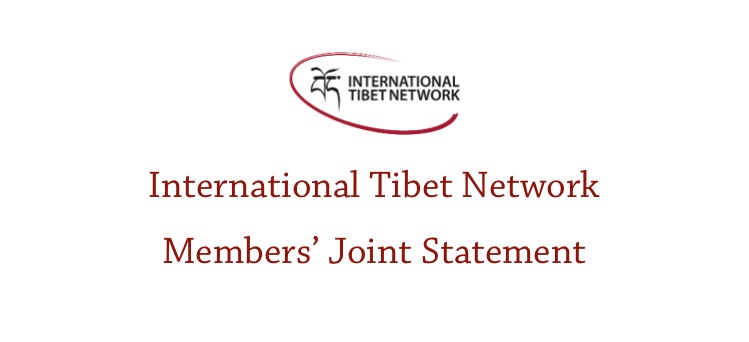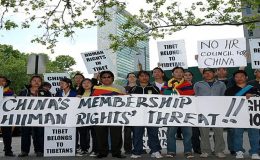Joint Statement by International Tibet Network
Thursday, 22 October 2009
The 166 member organisations of the International Tibet Support Network condemn the government of China for the executions of a number of Tibetans; Lobsang Gyaltsen, Loyak, Penkyi and reportedly a fourth unidentified Tibetan, in Lhasa on 20 October. China’s decision to execute these Tibetans is an affront to international judicial standards. These executions are clearly politically motivated (see Notes 1 & 2), and concerns that those convicted did not have a fair trial are well-founded. Tuesday’s executions show that China will use all methods at its disposal to intimidate Tibetans and crush all perceived opposition to its occupation of Tibet. Read the full statement
The 166 member organisations of the International Tibet Support Network condemn the government of China for the executions of a number of Tibetans; Lobsang Gyaltsen, Loyak, Penkyi and reportedly a fourth unidentified Tibetan, in Lhasa on 20 October. China’s decision to execute these Tibetans is an affront to international judicial standards. These executions are clearly politically motivated (see Notes 1 & 2), and concerns that those convicted did not have a fair trial are well-founded. Tuesday’s executions show that China will use all methods at its disposal to intimidate Tibetans and crush all perceived opposition to its occupation of Tibet.
Lobsang Gyaltsen and Loyak were sentenced to death on 8 April 2009. They had been charged with “starting fatal fires” in which, according to Xinhua, seven Chinese people died in Lhasa on 14 March 2008, when four days of peaceful protests by Tibetan monks in Lhasa escalated into city-wide unrest. A Xinhua statement on 8 April said they “have to be executed to assuage the people’s anger”. Judicial procedure calls for death sentence convictions to be reviewed by the Supreme People’s Court before sentences carried out, but no information is available if such reviews occurred in these cases.
The identity of the other Tibetans executed – Penkyi, and reportedly a fourth person – remains unclear. Three Tibetans received suspended death sentences on arson charges in April 2009. Gangtsu and Tenzin Phuntsog were given death sentences suspended for two years on the same day Lobsang Gyaltsen and Loyak were sentenced. In addition, a life sentence was handed to Dawa Sangpo.
On 21 April, Xinhua reported that three Tibetan women had been sentenced for charges of arson which led to the deaths of six people. Penkyi from Sakya received a death sentence suspended for two years, another Penkyi from Nyemo was sentenced to life imprisonment, and Chime Lhamo from Namling was sentenced to 10 years. In response to the executions, representatives of the Tibet movement made the following statements:
Lhadon Tethong, Executive Director of Students for a Free Tibet said: “These executions, the first known executions of Tibetans since 2003, are a travesty of justice and signal an alarming escalation in the Chinese government’s violent campaign to punish, intimidate, and silence Tibetans who dare to speak out against Chinese rule. Tibetans and their supporters worldwide will take to the streets in the coming days to condemn these executions and to demand immediate action on the part of our governments. We also call on U.S. President Obama to condemn these executions and to take bold and concrete action to help end China’s occupation of Tibet when he makes his first presidential visit to China next month.”
Paul Bourke from Australia Tibet Council said: “These brutal executions are more about China reinforcing political control in Tibet than about justice. The executions are meant to send a strong warning to Tibetans – any public display of dissatisfaction with China’s rule in Tibet will be dealt with in the harshest possible manner. Given this distressing news, it is all the more imperative that Prime Minister Rudd meet with the Dalai Lama in December to discuss constructive action the Australian government can take to help bring about a fair and just resolution for the Tibetan people.”
Dhardon Sharling of Tibetan Women’s Association said: “The members of the International Tibet Support Network sincerely hope that governments around the world will join in our condemnation of Tuesday’s executions. The Tibet issue, and the associated human rights abuses and brutal crackdown inflicted by the Chinese Government will not go away unless there is a concrete and viable political resolution to the 60-year occupation of Tibet, yet the Chinese authorities have disdainfully rejected His Holiness’ initiatives to bring about a mutually beneficial solution to both China and Tibet. We call on the international community to urge the Chinese leadership, in the strongest possible terms, to negotiate a peaceful solution to this long-standing injustice.”
Stephanie Brigden of Free Tibet added: “Tuesday’s executions are a particular outrage. Despite Chinese law providing that these cases should have been trialled in open court – where independent observers could have attended – these four Tibetans have been prosecuted behind closed doors. It is impossible to have any confidence that even the most basic legal safeguards were met. In December last year the UN confirmed that the use of confessions, obtained through torture to secure convictions is routine and widespread in China – even the Chinese Government officials have acknowledged that ‘nearly every wrongful verdict in recent years relates to illegal interrogation’.”
The member organisations of the International Tibet Support Network, a global coalition of Tibet campaign groups, demand that China:
- Not exacerbate this outrage by executing any more Tibetans, and immediately commute all remaining death sentences. * Publish the names and whereabouts of the more than 1,200 Tibetans missing since the protests of March and April 2008.
- Agree to the demand made in November 2008 by the UN Committee Against Torture for a “thorough and independent enquiry into the reported excessive use of force, including against peaceful demonstrators”.
- Reverse its rejection of the Dalai Lama’s initiatives and negotiate a peaceful resolution to the 60 year occupation of Tibet. The 166 members of the International Tibet Support Network call on all governments to condemn these executions and to secure from China guarantees that all trials of Tibetans be held in open court, defendants have access to independent legal representation, legal safeguards are adhered to, and consular staff and foreign journalists are permitted to attend such court proceedings, where requested.
Notes:





